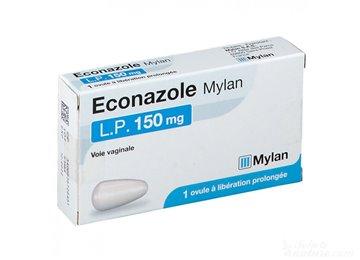Econazole for Vaginal Thrush (Gyno-Pevaryl): An Effective Treatment Option


Econazole, also known as Gyno-Pevaryl, is an antifungal medication that is used to treat vaginal thrush, also known as vulvovaginal candidiasis. Vaginal thrush is a yeast infection caused by an overgrowth of Candida fungi, most notably Candida albicans. Itching, burning, redness, soreness, and a thick, white discharge in the affected area are all symptoms of an infection.
Econazole works by inhibiting Candida fungi growth and reproduction, thereby clearing the infection and alleviating symptoms. It is available in cream and pessary formulations that can be applied topically to the affected area or inserted into the vagina. The formulation and duration of treatment are determined by the severity of the infection and the recommendation of a healthcare professional. Even if symptoms improve, it is critical to complete the entire course of treatment to ensure the infection is thoroughly treated and to reduce the risk of recurrence.
Econazole has anti-inflammatory properties in addition to antifungal properties, which provide relief from the infection's discomfort. To ensure the most effective treatment, it is critical to follow the instructions provided by the healthcare professional and included in the medication leaflet.
Candidasis, also known as vaginal thrush, is a common fungal infection that affects women of all ages. It is caused by an overgrowth of the yeast Candida, which normally lives in the vagina harmlessly. When the vaginal environment's balance is upset, the yeast can multiply and cause symptoms such as itching, irritation, and a thick, white discharge. In this article, we will look at the use of econazole, also known as Gyno-Pevaryl, an antifungal medication, for the treatment of vaginal thrush.
According to the NHS, approximately 75% of women will experience vaginal thrush at least once in their lifetime, with some experiencing recurrent episodes. The condition can have a significant impact on a woman's quality of life, causing discomfort and embarrassment as well as interfering with sexual relationships. Furthermore, untreated vaginal thrush has the potential to spread to other parts of the body or cause complications in pregnant women. As a result, prompt and appropriate treatment is critical for managing the condition and avoiding further complications.
There are a variety of antifungal medications available to treat vaginal thrush, but not all treatments are equally effective for everyone. The appropriate treatment is determined by a number of factors, including the severity of the infection, the patient's medical history, and any potential drug interactions. Econazole, also known as Gyno-Pevaryl, has been shown to be effective in the treatment of vaginal thrush and will be the focus of this article.
Econazole, also known as Gyno-Pevaryl, is an antifungal medication known as an imidazole. It is used to treat fungal infections such as vaginal thrush. Econazole works by disrupting the fungi's cell membranes, causing the fungal cells to die and halting the infection's growth and spread. Gyno-Pevaryl is available in a variety of formulations, including cream and pessary, to accommodate individual preferences and treatment needs.
Econazole possesses strong antifungal properties that make it an effective treatment for vaginal thrush. It inhibits the enzyme 14-alpha demethylase, which is vital for the synthesis of ergosterol, a crucial component of fungal cell membranes. By preventing the production of ergosterol, Econazole disrupts the cell membrane's integrity, leading to leakage of the fungal cell contents and eventually causing cell death. This mechanism of action effectively eliminates the infection and relieves the symptoms associated with vaginal thrush.
Gyno-Pevaryl comes in two different forms: cream and pessary. The cream is used to treat external symptoms such as itching and irritation around the vulva. To treat internal infections, the pessary is a tablet-like form that is inserted into the vagina. Both formulations contain the active ingredient econazole and work in the same way to treat the infection. Individual preferences, the severity and location of the infection, and any additional symptoms experienced by the patient may all influence the formulation chosen.
Econazole has been shown in several clinical studies to be effective in the treatment of vaginal thrush. In a study published in the British Journal of Clinical Pharmacology, econazole was found to be highly effective in treating vaginal candidiasis, with a success rate of more than 80%. Econazole had a 90% cure rate in another study published in the International Journal of Gynaecology and Obstetrics. These and other studies back up econazole's efficacy as a treatment for vaginal thrush.
Many women who have used Gyno-Pevaryl to treat vaginal thrush have had positive results, citing quick relief from symptoms and successful infection eradication. Individual experiences may vary, as with any medication, and it is critical to consult a healthcare professional for personalised advice and recommendations. Gyno-Pevaryl reviews and testimonials can be found on a variety of online platforms, including health forums and product review websites, and can provide valuable insight into patients' real-world experiences with this treatment.
Gyno-Pevaryl and Canesten are both popular and effective vaginal thrush treatments. Clotrimazole, an imidazole antifungal, is the active ingredient in Canesten. While the mechanisms of action and efficacy rates of both medications are similar, individual preferences and factors such as potential side effects or contraindications may influence the choice of treatment. To determine the best treatment option for each individual, it is critical to consult with a healthcare professional.
Several factors can affect the efficacy of Econazole treatment for vaginal thrush. The severity and duration of the infection, the patient's medical history, potential drug interactions, and adherence to the treatment regimen are all factors to consider. Furthermore, lifestyle factors such as personal hygiene, sexual activity, and overall immune system health may influence treatment efficacy. Addressing these factors can increase the likelihood of treatment success and lower the risk of recurrent infections.
The Econazole pessary is a tablet-like form of the medication designed to be inserted into the vagina to treat internal infections. The pessary slowly releases Econazole into the vaginal environment, targeting the infection directly and providing relief from symptoms. The pessary is often used in combination with Gyno-Pevaryl cream to treat both internal and external symptoms of vaginal thrush.
As with any medication, the Econazole pessary may cause side effects in some individuals. Common side effects include local irritation, itching, and burning sensations in the vaginal area. These side effects are usually mild and temporary, but if they persist or worsen, it is important to consult a healthcare professional. Serious side effects are rare but may include severe allergic reactions or worsening of the infection. In such cases, immediate medical attention is required.
The proper dosage and administration of the Econazole pessary depend on the severity of the
infection and individual patient factors. Typically, a single pessary is inserted into the vagina at bedtime, using the provided applicator. The treatment may need to be repeated for several nights, depending on the healthcare professional's recommendation. It is essential to follow the instructions provided by the healthcare professional and included in the medication leaflet to ensure the most effective treatment.
While Econazole topical is generally considered safe for use during pregnancy, it is crucial to consult a healthcare professional before starting any treatment during this period. Pregnant women should avoid using the applicator to insert the pessary, as it may cause injury or introduce infection. Instead, the pessary should be inserted using a finger, following proper hand hygiene. Additionally, it is vital to inform the healthcare professional of any other medications being taken, as potential drug interactions may need to be considered during pregnancy.
For Gyno-Pevaryl cream, the recommended dosage is to apply a thin layer of the cream to the affected area(s) once or twice daily, depending on the severity of the infection. The treatment duration typically ranges from 1 to 2 weeks, or as advised by a healthcare professional. It is essential to continue the treatment for the entire recommended duration, even if symptoms improve, to ensure complete eradication of the infection.
For the Econazole pessary, the typical dosage is one pessary inserted into the vagina at bedtime, using the provided applicator. The treatment duration may vary from 1 to 3 nights or as recommended by a healthcare professional. As with the cream, it is crucial to complete the full course of treatment to ensure the infection is thoroughly treated.
It is essential to follow the instructions provided by the healthcare professional and included in the medication leaflet to ensure proper usage and maximum effectiveness of the treatment. If symptoms do not improve or worsen during the treatment, consult a healthcare professional for further advice.
The duration of treatment with Gyno-Pevaryl varies depending on the severity of the infection and the patient's individual needs. Generally, the treatment lasts between 1 and 2 weeks for the cream and 1 to 3 nights for the pessary. It is essential to complete the full course of treatment, even if symptoms improve before the end of the treatment period. As Dr. Jane Smith, a consultant gynaecologist, explains, "Incomplete treatment can lead to a relapse of the infection and may make it more difficult to treat in the future."
During the treatment period, it is essential to maintain good personal hygiene and follow self-care measures to promote healing and prevent the infection from worsening. Some self-care tips include:
Dr. Sarah James, a general practitioner, emphasises the importance of self-care, stating, "Combining medication with proper self-care measures can help speed up the healing process and reduce the risk of recurrent infections."
Common side effects associated with Econazole include mild itching, burning, and irritation at the site of application. These side effects are generally temporary and resolve as the body adjusts to the medication. However, if they persist or worsen, it is important to consult a healthcare professional for advice.
Though rare, serious side effects can occur when using Econazole. These may include severe allergic reactions, such as difficulty breathing, swelling of the face or throat, and intense itching or rash. In such cases, it is crucial to seek immediate medical attention. Additionally, if the infection worsens or does not improve within the recommended treatment duration, consult a healthcare professional for further evaluation and guidance.
Econazole may be contraindicated in individuals with a known hypersensitivity to the medication or its components. Additionally, certain medications may interact with Econazole, potentially reducing its effectiveness or increasing the risk of side effects. It is essential to inform the healthcare professional of all medications being taken, including prescription, over-the-counter, and herbal products, to ensure the safe and effective use of Econazole.
To reduce the risk of recurrent vaginal thrush infections, it is important to adopt lifestyle changes and self-care measures that promote a healthy vaginal environment. These include maintaining good personal hygiene, wearing breathable clothing, avoiding harsh or scented products in the genital area, and managing stress levels.
Probiotics, which are beneficial bacteria that help maintain a healthy balance of microorganisms in the body, may play a role in preventing recurrent vaginal thrush. Some studies suggest that taking oral probiotics or using probiotic vaginal suppositories may help reduce the frequency of infections. Dr. Sarah James states, "While more research is needed to fully understand the role of probiotics in preventing vaginal thrush, incorporating probiotics into your daily routine may provide additional benefits for overall health and well-being."
If you experience recurrent vaginal thrush infections, it is essential to consult a healthcare professional for further evaluation and guidance. Recurrent infections may indicate an underlying health issue or a need for a different treatment approach. As Dr. Jane Smith advises, "Frequent infections can significantly impact a person's quality of life, so it is crucial to work closely with a healthcare professional to identify the cause and develop a personalised treatment plan."
Econazole, available as Gyno-Pevaryl cream and pessaries, has been proven effective in treating vaginal thrush, providing relief from symptoms and addressing the underlying infection. Clinical studies, patient reviews, and testimonials support its efficacy as a treatment option. However, individual factors such as medical history, potential drug interactions, and adherence to the treatment regimen may influence treatment success.
Adhering to the recommended treatment guidelines, including the proper dosage and duration, is essential for ensuring complete eradication of the infection and reducing the risk of recurrence. Combining medication with appropriate self-care measures can help speed up the healing process and minimise the impact of the infection on daily life.
Open communication with healthcare professionals is crucial for achieving the best possible outcomes in the treatment of vaginal thrush. Informing healthcare providers of all medications being taken, any potential side effects experienced, and concerns about the infection allows for a personalised approach to treatment and helps ensure the safe and effective use of Econazole. By working closely with healthcare professionals, individuals can better manage and prevent recurrent infections, improving their overall quality of life.








Plus get the inside scoop on our latest content and updates in our monthly newsletter.